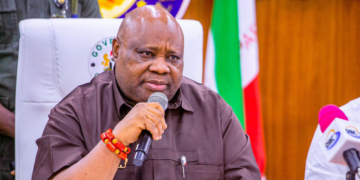In a renewed effort to restore public confidence in Nigeria’s financial system and eliminate fears surrounding cyber fraud and financial scams, the Federal Government has convened a national stakeholders’ workshop to review and validate a National Framework on strengthening trust for sustainable economic and financial inclusion.
The initiative, championed by the Presidential Committee on Economic and Financial Inclusion (PreCEFI), aims to harmonise existing policies and regulatory efforts across sectors to address long-standing trust issues that discourage many Nigerians, especially the poor and vulnerable, from participating in the formal banking system.
Speaking at the workshop held at the State House, Presidential Villa, Technical Advisor to the President on Economic and Financial Inclusion in the Office of the Vice President, Dr. Nurudeen Abubakar Zauro, emphasised that financial inclusion was at the heart of President Bola Tinubu’s Renewed Hope Agenda.
“If you look at the Renewed Hope Agenda, almost all eight priority areas touch on financial inclusion—especially access to capital and inclusivity. Every economically active Nigerian must not be left behind,” Dr. Zauro said.
He noted that recent increases in cybercrime, fraudulent financial schemes – commonly referred to as ‘419’, and weak redress mechanisms have created widespread public distrust in the formal banking system, discouraging millions from opening or using bank accounts.
“For people to come into the formal financial sector, there must be confidence in the system. If you lose ₦1,000 at a POS, that may be worth ₦10 million to someone else. So restoring trust is key,” he added.
Dr. Zauro cited the 2004 directive issued by President Tinubu as Lagos State Governor, which focused on building partnerships, collaboration, and institutional trust.
He said the current national framework seeks to replicate that model on a broader scale, bringing together regulators, lawmakers, the judiciary, and private sector players.
“We are harmonising all existing efforts—what the Central Bank is doing, what the regulators are doing, and what agencies like the Federal Competition and Consumer Protection Commission (FCCPC) are doing. But more importantly, we want one unified national framework, backed by all arms of government,” he said.
He added that even judicial officers must understand financial literacy and dispute resolution to administer justice effectively in financial-related matters.
“This is about building trust for the last man, the poor and vulnerable Nigerian. So when someone sells cattle for ₦1 million, instead of hiding it under a pillow, they should be able to walk into a bank with confidence that their money is safe,” he said.
Also speaking to state house correspondents at the sidelines of the workshop, Director of Consumer Protection and Financial Inclusion at the Central Bank of Nigeria (CBN), Dr. Aisha Isa Olatiwoon, affirmed the apex bank’s commitment to consumer protection but clarified the procedure for complaints.
“Customers must first escalate unresolved complaints to their banks. If there’s no resolution within the regulatory timeframe, or if the outcome is unsatisfactory, then they can escalate to the CBN,” she explained.
Dr. Olatiwoon revealed that the CBN was already operating a Customer Complaint Management Solution and working to integrate it with the broader Industry Dispute Resolution System to improve visibility, accountability, and enforcement.
“We want a system where we can monitor in real time how banks are handling complaints and hold them accountable if they fall short,” she said.
She noted that collaboration among various financial and non-financial regulators was essential, as financial literacy and consumer protection are central to the goals of sustainable banking and nationwide financial inclusion.
Zauro concluded that the workshop was not just a policy talkshop but a decisive step toward implementation.
“We’re not just talking. The national framework will be formally issued and, if necessary, backed by legislation. Mr. President is ready to do all that is needed to restore confidence. With trust restored, we can deepen the system and fully tap into opportunities like the African Continental Free Trade Area (AfCFTA),” he said.
The National Framework on Strengthening Trust for Financial Inclusion will soon be launched at the Central Bank of Nigeria and is expected to become a unifying policy document guiding regulators, financial institutions, and policymakers on consumer protection and trust-building.






